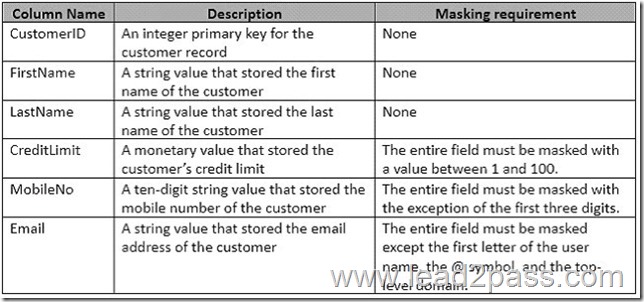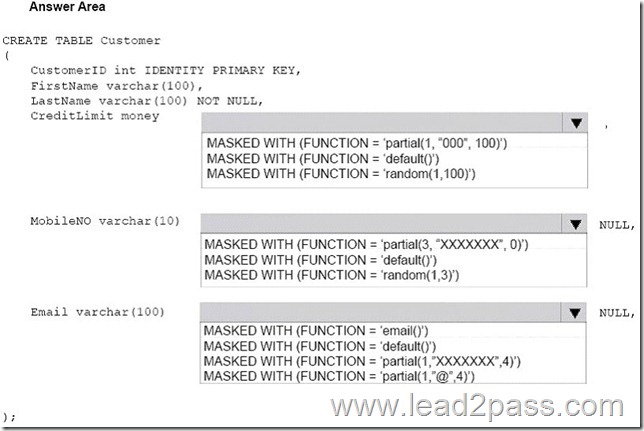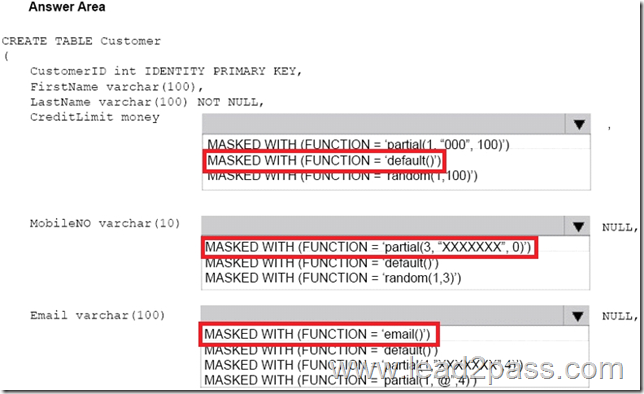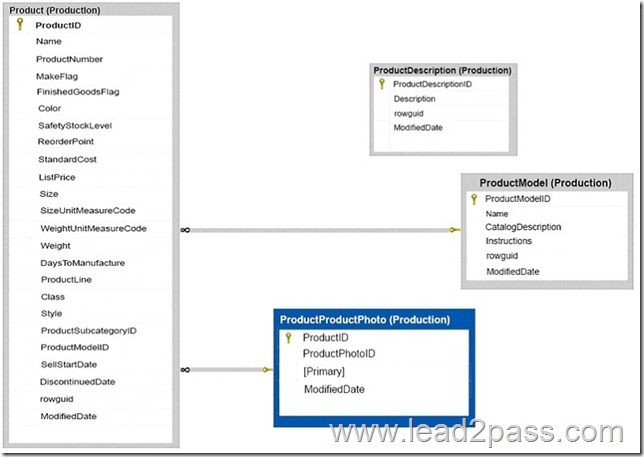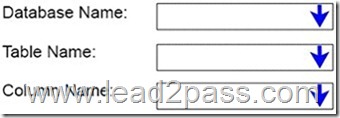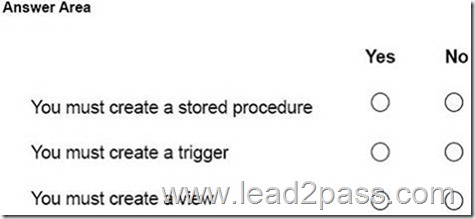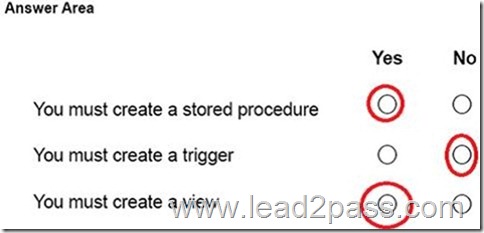Lead2pass 2018 New Microsoft 70-762 Braindump Free Download:
https://www.lead2pass.com/70-762.html
QUESTION 11
You are a database developer for a company.
he company has a server that has multiple physical disks.
The disks are not part of a RAID array.
The server hosts three Microsoft SQL Server instances.
There are many SQL jobs that run during off-peak hours.
You must monitor the SQL Server instances in real time and optimize the server to maximize throughput, response time, and overall SQL performance.
What should you do?
A. A. Create asys.dm_os_waiting_tasks query.
B. Create a sys.dm_exec_sessions query.
C. Create a Performance Monitor Data Collector Set.
D. Create a sys.dm_os_memory_objects query.
E. Create a sp_configure ‘max server memory’ query.
F. Create a SQL Profiler trace.
G. Create a sys.dm_os_wait_stats query.
H. Create an Extended Event.
Answer: B
QUESTION 12
You are a database developer for a company.
The company has a server that has multiple physical disks.
The disks are not part of a RAID array.
The server hosts three Microsoft SQL Server instances.
There are many SQL jobs that run during off-peak hours.
You must monitor the SQL Server instances in real time and optimize the server to maximize throughput, response time, and overall SQL performance.
You need to ensure that the performance of each instance is consistent for the same queried and query plans.
What should you do?
A. Create a sys.dm_os_waiting_tasks query.
B. Create a sys.dm_exec_sessions query.
C. Create a Performance Monitor Data Collector Set.
D. Create a sys.dm_os_memory_objects query.
E. Create a sp_conftgure ‘max server memory’ query.
F. Create aSQL Profiler trace.
G. Create asys.dm_os_wait_stats query.
H. Create an Extended Event.
Answer: H
QUESTION 13
You are a database developer for a company.
The company has a server that has multiple physical disks.
The disks are not part of a RAID array.
The server hosts three Microsoft SQL Server instances.
There are many SQL jobs that run during off-peak hours.
You must monitor the SQL Server instances in real time and optimize the server to maximize throughput, response time, and overall SQL performance.
You need to collect query performance data while minimizing the performance impact on the SQL Server.
What should you do?
A. Create a sys.dm_os_waiting_tasks query.
B. Create a sys.dm_exec_sessions query.
C. Create a Performance Monitor Data CollectorSet.
D. Create a sys.dm_os_memory_objects query.
E. Create a sp_configure ‘max server memory’ query.
F. Create a SQL Profiler trace.
G. Create a sys.dm_os_wait_stats query.
H. Create an Extended Event.
Answer: C
QUESTION 14
You are a database developer for a company.
The company has a server that has multiple physical disks.
The disks are not part of a RAID array.
The server hosts three Microsoft SQL Server instances.
There are many SQL jobs that run during off-peak hours.
You must monitor the SQL Server instances in real time and optimize the server to maximize throughput, response time, and overall SQL performance.
You need to create a baseline set of metrics to report how the computer running SQL Server operates under normal load. The baseline must include the resource usage associated with the server processes.
What should you do?
A. A. Create a sys.dm_os_waiting_tasks query.
B. Create a sys.dm_exec_sessions query.
C. Create a Performance Monitor Data Collector Set.
D. Create a sys.dm_os_memory_objects query.
E. Create a sp_configure ‘max server memory’ query.
F. Create a SQL Profiler trace.
G. Create asys.dm_os_wait_stats query.
H. Create an Extended Event.
Answer: D
QUESTION 15
Hotspot Question
You have a database named Sales.
You need to create a table named Customer that includes the columns described in the following table:
How should you complete the Transact SQL statement? To answer, select the appropriate TransactSOL segments in the answer area.
Answer:
QUESTION 16
Hotspot Question
You are developing an app that allows users to query historical company financial data.
You are reviewing email messages from the various stakeholders for a project.
The message from the security officer is shown in the Security Officer Email exhibit below.
TO: Database developer
From: Security Officer
Subject: SQL object requirements
We need to simplify the security settings for the SQL objects. Having a assign permissions at every object in SQL is tedious and leads to a problem. Documentation is also more difficult when we have to assign permissions at multiple levels. We need to assign the required permissions at one object, even though that object may be obtaining from other objects.
The message from the sales manager is shown in the Sales Manager Email exhibit below.
TO: Database developer
From: Sales Manager
Subject: Needed SQL objects
When creating objects for our use, they need to be flexible. We will be changing the base infrastructure frequently. We need components in SQL that will provide backward compatibility to our front end applications as the environments change so that do not need to modify the front end applications. We need objects that can provide a filtered set of the data. The data may be coming from multiple tables and we need an object that can provide access to all of the data through a single object reference. This is an example of the types of data we need to be able to have queries against without having to change the front end applications.
The message from the web developer is shown in the Web Developer Email exhibit below.
TO: Database developer
From: Web Developer
Subject: SQL Object component
Whatever you will be configuring to provide access to data in SQL, it needs to connect using the items referenced in this interface. We have been using this for a long time, and we cannot change this from end easily. Whatever objects are going to be used in SQL they must work using object types this interface references.
You need to create one or more objects that meet the needs of the security officer, the sales manager and the web developer.
For each of the following statements, select Yes if the statement is true. Otherwise, select No.
Answer:
QUESTION 17
You have a database that contains a table named Employees.
The table stored information about the employees of your company.
You need to implement the following auditing rules for the Employees table:
– Record any changes that are made to the data in the Employees table.
– Customize the data recorded by the audit operations.
Solution: You implement a user-defined function on the Employees table.
Does the solution meet the goal?
A. Yes
B. No
Answer: A
QUESTION 18
You have a database that contains a table named Employees.
The table stored information about the employees of your company.
You need to implement the following auditing rules for the Employees table:
– Record any changes that are made to the data in the Employees table.
– Customize the data recorded by the audit operations.
Solution: You implement a check constraint on the Employees table.
Does the solution meet the goal?
A. Yes
B. No
Answer: B
70-762 dumps full version (PDF&VCE): https://www.lead2pass.com/70-762.html
Large amount of free 70-762 exam questions on Google Drive: https://drive.google.com/open?id=0B3Syig5i8gpDMW9NcjJrQXlsMGs
You may also need:
70-761 exam dumps: https://drive.google.com/open?id=0B3Syig5i8gpDU2RSQnhzX2pIZVE
70-764 exam dumps: https://drive.google.com/open?id=0B3Syig5i8gpDUjBoM0pVQnlUTlU
70-765 exam dumps: https://drive.google.com/open?id=0B3Syig5i8gpDejczeWp0aURaSnM
70-767 exam dumps: https://drive.google.com/open?id=0B3Syig5i8gpDdTF0R0taLWgxSmc
70-768 exam dumps: https://drive.google.com/open?id=0B3Syig5i8gpDZ2pRQkV6Vnc4dHc
